Veni, Vedi, Vasectomy?
June 5, 2015 at 2:54 pm | Posted in Capitalism, democracy, Human Rights, international relations, Labor, Political Economy, Production, world politics | 1 CommentTags: Europe, European Union, Eurozone, France, Germany, Greece
On June 3, when the President of the European Commission (EC), Jean-Claude Juncker conveyed the collective demands of Greece’s creditors—the European Central Bank (ECB), the European Commission, and the International Monetary Fund—to the embattled country’s Prime Minister, Alexis Tsipras, a member of his governing Syriza party said of the Greek delegation: “They came, they saw, and they had their balls handed to them.”
Five months after the anti-austerity party rode to victory in the Greek elections and had renounced efforts by previous Greek governments to impose austerity measures that had led the country’s debt grow from 124 per cent of GDP to 180 per cent and its unemployment rate soar to 25 per cent (and youth unemployment to 60 per cent) and its pensioners see their meagre pensions decline even faster, the German Chancellor Angela Merkel invited the IMF’s Managing Director Christine Lagarde and the President of the ECB, Mario Draghi to a previously scheduled meeting between herself, Juncker, and the French President Francois Hollande on June 1 to draft a common negotiating position among Greece’s creditors. Prime Minister Tsipras was notably not invited.

Papering over their differences, the 5-page demands Juncker delivered to Tsipras made some concessions to Greece—lowering the demand that the primary surplus for 2015 be 1 per cent rather than the 3-4 per cent that had been the earlier demand—but also included “red lines” that the Syriza-led government had vowed never to cross such as generating 2 per cent of the GDP from cutting pensions and raising VAT to a uniform level (except on food, medicines, and hotels), not to reverse the labor market reforms that the ‘troika’ (the ECB, the EC, and the IMF) had forced down the throats of previous governments, and even to establish an ‘independent’ tax and customs agency and thereby making its operations beyond the ambit of elected officials.
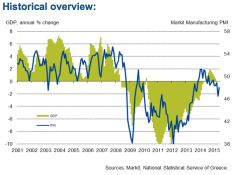
Yet, far beyond debates on primary surpluses and ‘red lines,’ the real struggle between Greece and its “European partners” is over politics. The positions are clear. Because of the single currency, an indebted country like Greece cannot devalue its currency and thereby cheapen its exports and with the increase in exports (and tourism) repay its debts. Hence the ‘troika’ (now renamed ‘the institutions’) were attempting to impose an ‘internal devaluation’ on Athens: forcing it to cut minimum wages and increase labor market ‘flexibility’ (making it easier to hire and fire workers and thereby also curb labor militancy) to force down the prices of Greek products to increase exports, to privatize government assets, improve taxation and efficiency in collecting taxes, and to sharply reduce government expenditures by severely cutting welfare programs and reducing public sector employment and pensions. Syriza and other opponents of the ‘austerity’ measures have argued that these measures actually impede Greece’s ability to repay its loans: if people don’t have money due to welfare cuts, job losses, etc., they cannot buy goods and hence more businesses fail. Indeed, Greece’s GDP has contracted by over 25 per cent in the five years of troika-mandated austerity and its unemployment remains high while its debt as a ratio of GDP has grown from 124 per cent to 180 per cent.
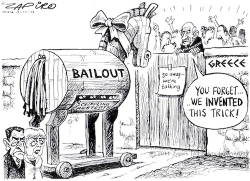
As Robert Preston, the BBC’s economics editor puts it:
But although for the pride of the creditors, the question of whether Greece is obliged to generate a surplus on its budget, excluding interest payments, of a bit more than zero or 3%, feels like a world of difference – it is a rounding error compared with the money Greece owes them, which is equivalent to 180% of Greek GDP.
In the highly unlikely event that Greece could generate a 2% or 3% surplus year-in and year-out without its economy shrinking further (which few economists would anticipate), it would take around half a century for Greek public sector debt to fall to a level regarded as sustainable. gett A half century of austerity? In what modern democracy would that be regarded as a realistic option?
Most egregiously, sharp cuts in expenditure has meant that in some hospitals budgets have fallen by 94 per cent. How can this be sustainable in a continent as rich as Europe?
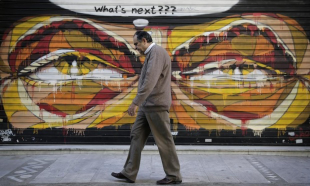
It is clear that one way or another, as Nils Pratley wrote in the Guardian, there will have to be a debt write-down. What Greece’s European “partners” are unwilling to countenance is Syriza’s demands to reverse the “austerity” measures because they want to root out any left-wing challenge to the reigning neo-liberal orthodoxy. Once Greece caves in, subjects itself to ‘vasectomy’ in the words of one of its MPs, then debt-relief could be offered but not before. To offer a write-down of the debt is particularly terrifying to Spain where the governing party has already lost many local elections to a Syriza-like party, Podemos, which now controls the three major cities of Madrid, Barcelona, and Valencia. It is also threatening to other EU economies like Portugal, Ireland, and Italy which have been compelled to implement austerity measures.
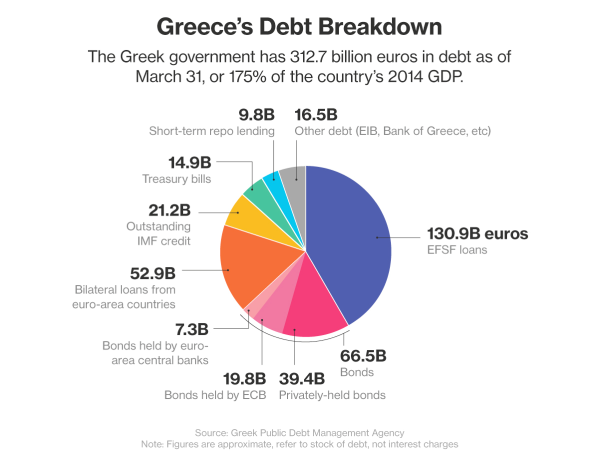
Syriza has, however, done its cause no favors despite some eloquent posturing by its Finance Minister, Yanis Varoufakis. It has not demanded a write down of the debt—and we must remember that when the troika made the first loan to Greece in 2010, Germany and France explicitly demanded that the austerity not be extended to the military—and Greece has been the best customer of the German arms industry. How is the cutting of pensions and salaries to workers while maintaining higher than the EU average in military spending morally justifiable?

With Syriza maintaining the charade of negotiating with its European ‘partners’ over the last months, Greece’s position has rapidly deteriorated as frightened depositors have withdrawn their money from the banks and even transferred them outside the country. By the end of April, Greece’s bank deposits were at their lowest level since 2004 and by the end of last week deposits were being withdrawn at the daily rate of 1 billion euros.
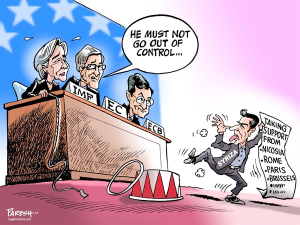
Interestingly, the Speaker of the Greek Parliament, Zoe Konstantopoulou, has set up a Debt Truth Committee to report to parliament on June 18
is said to be on the point of finding some of Greece’s original bailout debt, from either 2010 or 2011, was unlawfully contracted. In addition, Ms Konstantopoulou is armed with a finding from experts that Germany owes Greece €350bn in war reparations – more than the whole of its debt to Europe.
This could open up a host of legal challenges even if Tsipiras was to finally cave into the troika’s demands. The question is whether the Left Platform within Syriza is strong enough to prevent a cave in when there is nothing the troika would like than to install a government of national unity with a rump Syriza. That would, temporarily at least till Spain’s November election, decapitate the European Left. Will it happen?

In the short run, if no resolution is found, Greece will be unable to make scheduled payments to its creditors and being declared to be in default would make its borrowing costs in private capital markets intolerable; Syriza’s reluctance to impose capital controls would lead to the swift collapse of its banking sector unless the government begins to issue a virtual currency against future revenues which could ease the liquify crunch domestically at least. But Greece cannot be thrown out of the EU without its consent as all decisions must be unanimous. Even if Greece were to exit the common currency—Grexit as it has been dubbed—it would call the whole European project into question. It is also unrealistic to expect a country as bankrupt as Greece to police its borders when hordes of refugees from Africa and the Middle East are streaming to Europe—and from Greece, they could move to any country in the Schengen area. Will this be enough for its European ‘partners’ to blink?
Detroitism in Binghamton: A Photo Essay
July 27, 2013 at 9:56 am | Posted in Capitalism, democracy, Human Rights, Outsourcing, Political Economy, world politics | 3 CommentsTags: Capitalism, democracy, Human Rights, Manufacturing, United States, Urban, world politics, World-economy

Detroitism has emerged a while ago to encapsulate the emergence of urban ruins in North America and Europe–from Camden NJ to Naples and Bucharest–with the decline of manufacturing and the outsourcing of production to low- and middle-income economies in Asia and Latin America. Populations of these cities have declined sharply–from 1.8 million fifty years ago to 700,000 today in Detroit, shrinking tax revenues and depressing property values leading to a degradation of city services and civic amenities and spiking the crime rate. Abandoned houses are stripped of their valuables–metal and copper are sold to junk merchants to be sent to India and China to be melted down and recycled to fuel these ’emerging economies.’

Smaller towns and cities in the United States have been declining even longer–for more than a century as the mechanization of agriculture and the exhaustion of natural resources set in even before manufacturing began to move to the non-unionized states of the ‘Sunbelt’ and later to even lower-wage locations overseas. And the emergence of ‘big box’ retailers like Wal-mart hollowed out their commercial cores as Edward Alden noted.

And so it has been with Binghamton, located at the confluence of the Susquehanna and the Chenango rivers in southern New York State. A small farming community till the Chenango Canal was constructed in the mid-1830s, linking it the the Erie Canal at Utica. In addition, the arrival of the railways in the mid-19th century transformed the area into a minor industrial hub for the production of cigars, and later shoes, and high-tech electronics. Between 1860 and 1880, the population of Binghamton rose from 8,325 to a little over 35,000. Tanneries and shoe factories–most notably the Endicott Johnson shoe factory–made Binghamton and its neighboring Johnson City one of the major shoe manufacturing centers in the United States
B y the mid-1950s however, competition from several other locations led to a steep decline of shoe production though its impact was cushioned by the rise of several high-tech firms: IBM which was founded in nearby Endicott, Edwin Link who invented the flight stimulator, Valvoline which was to become Whirlpool Corporation
y the mid-1950s however, competition from several other locations led to a steep decline of shoe production though its impact was cushioned by the rise of several high-tech firms: IBM which was founded in nearby Endicott, Edwin Link who invented the flight stimulator, Valvoline which was to become Whirlpool Corporation

At the same time, the construction of the interstate highway system, led to a fall in ridership on the trains and the last passenger train rolled off the tracks of the Lackawanna Station in Binghamton in December 1964.

The continuing growth of IBM and other technology companies related to defense and the location of one of the four university centers of the State University of New York system led to further growth over the next two decades.
Yet, the gradual decline of IBM and the closure of the last shoe factory in the 1990s led to a precipitous decline in the fortunes of the city. The arrival of big box retailers like Wal-Mart finally hollowed out the city’s commercial core.
The population of Binghamton, which had peaked at 80.674 in 1950 slid to 47, 376 in the census of 2010–less than it was a 100 years ago in 1910.














Imperial Hubris: European Subservience to the United States
July 3, 2013 at 10:53 pm | Posted in Capitalism, democracy, Human Rights, International Relations, Political Economy, World Politics | 1 CommentTags: Bolivia, France, Germany, Italy, Portugal, Russia, Spain, United Kingdom, United Nations, United States, whistle blower
Rarely in modern history has a statesman’s words been so at odds with his actions as those of French President Francois Hollande in dealing with US spying on its allies. When Mr Edward Snowden, the former US National Security Agency (NSA) infrastructure analyst, revealed that the NSA had bugged the European Union’s offices and embassies of several EU member states, tapped into communications cables, and bugged the 2009 meeting of the G20 leaders in the UK, the French president thundered that this was “unacceptable behaviour” among friends and allies. Yet, on suspicion that Mr Snowden may have been on board the Bolivian President Evo Morales’ plane, Paris took the unprecedented step of refusing the plane permission to fly over its territory on Tuesday.

Actions speak louder than words and while European leaders have feigned outrage about the US eavesdropping on the communications of its citizens and bugging of their embassies, they did not want the man who revealed the extent of US espionage to seek asylum in their countries. If Mr Snowden were on the Bolivian president’s plane and if he were to ask for asylum during a refuelling stop, it would have placed the government of a European state in an impossible situation. Since EU-wide laws prohibit the extradition of persons to countries with capital punishment, it would be politically suicidal for any government to deliver him to Washington. Yet, while European leaders were vociferous in denouncing US espionage, none were willing to defy the US on the issue.
 Hence, France, Portugal and Spain took the unprecedented step of revoking pre-arranged flight permissions for President Morales’ plane—an action in which they were subsequently joined by Italy. When the plane, running low on fuel, finally landed in Vienna’s Schwechat airport, President Morales was prevented from leaving for 13 hours while the Austrians satisfied themselves that Mr. Snowden was not on the plane.
Hence, France, Portugal and Spain took the unprecedented step of revoking pre-arranged flight permissions for President Morales’ plane—an action in which they were subsequently joined by Italy. When the plane, running low on fuel, finally landed in Vienna’s Schwechat airport, President Morales was prevented from leaving for 13 hours while the Austrians satisfied themselves that Mr. Snowden was not on the plane.
Let us be clear: Mr Snowden is not a spy. He did not steal US secrets at the behest of a foreign power. He did not publish the contents of the espionage. He merely revealed its massive reach, and its sheer illegality and violation of human rights on a planetary scale by tracking the communications of citizens the world over. He is a whistleblower. The UN defines a whistleblowers “as individuals releasing confidential or secret information although they are under an official or other obligation to maintain confidentiality of secrecy.”

The special UN rapporteur for the freedom of expression in 2004, along with his counterparts in the Organization for Security and Cooperation in Europe and the Organization of American states, the Guardian newspaper reports, enjoined all governments to protect whistleblowers from all “legal, administrative or employment-related sanctions if they act in ‘good faith’”. By revealing the magnitude of US espionage against their citizens and governments, Mr Snowden clearly acted in public interest.

Indeed, before Mr Snowden’s revelations, the Director of US National Intelligence, Mr James Clapper had testified to the US Senate Intelligence Committee that in March that the NSA did not collect data indiscriminately on millions of Americans—a testimony he was compelled to retract this week on the scarcely credible ground that he had “simply did not think” of the relevant provision in the Patriot Act that permitted the collection of such data. Likewise, President Barack Obama had claimed several times that the NSA was not eavesdropping on phone calls domestically without warrants—a claim that is proven wrong by Mr Snowden’s revelations.
Jean Asselborn, the foreign minister of Luxembourg, observed that “Americans justify everything by terrorism. The EU and its diplomats are not terrorists.”
Let us also recall that these very same European governments—especially Spain and Portugal—allowed the use of their “airspace and airports for flights associated with CIA secret detention and extraordinary rendition [torture] operations” as the Open Society’s Globalizing Torture: CIA Secret Detention and Extraordinary Rendition investigation uncovered in a report published earlier this year. An ongoing investigation in France is examining whether the government permitted similar CIA flights. Victims can be carried over their airspace to be tortured but whistleblowers who reveal breaches of their citizens’ privacy and of their own sovereignty cannot! And this from member states of the EU that won the 2012 Nobel Peace Prize for the “advancement of peace and reconciliation, democracy and human rights in Europe”!

Speaking out against US actions while surreptitiously aiding Washington is, of course, not a novel practice for its European allies. Ten years ago, the then French president Jacques Chirac loudly proclaimed that an assault against Saddam Hussein’s Iraq was unacceptable to Paris but when the US assault started Chirac opened French airspace to US military flights—something he had not done as premier for Reagan’s attack on Libya in 1986. Though Germany also opposed the Iraq war, once it had begun, its foreign minister prayed for the ‘rapid collapse’ of the resistance. Even Russian president Vladimir Putin for a decisive victory for the US ‘for economic and political reasons,’ just as he offered asylum to Mr Snowden on conditions that he knew would be unacceptable.

The current generation of European leaders have not known a time in their lives when the United States did not dominate their countries—in the economic, political, and perhaps even cultural arenas. For them to symbolically challenge the US is one thing, to challenge it substantively is another thing altogether. Hence, even when their sovereignty was violated with the bugging of their diplomatic missions and EU offices, and when the privacy of their citizens was infringed by the tapping of their phones and digital communications, all they could do was to do all they could to see that Mr Snowden does not seek asylum in their countries even if that meant endangering the lives of President Morales and his entourage. Would they have done that if President Morales was of European descent?

A Fog of Myths About North Korea
April 29, 2013 at 1:59 pm | Posted in Arms Control, Capitalism, Human Rights, International Relations, Nuclear Non-Proliferation, Political Economy, World Politics | Leave a commentTags: China, East Asia, India, interstate system, Israel, Japan, North Korea, Pakistan, South Korea, the Philippines, United Nations, United States, US hegemony, Vietnam
Rarely has the manufacturing of consent in the mainstream media been as thorough as it has been in the case of North Korea. It is the original ‘hermit kingdom,’ isolated from the outside world by a dynasty of communist dictators–a ‘socialism in one family’–and irrational to the extent of threatening Washington with a nuclear Armageddon. This reigning consensus is so widespread that there has been little challenge to it in the major news outlets of the world and yet, a moment’s reflection suggests that there are many flaws in this narrative.
In the first instance, in a rare piece of insight into North Korea, a former Western intelligence officer who writes under the pseudonym of James Church has argued that since isolationism is a two-way street, the rest of the world is even more ignorant about North Korea than Pyongyang is about the wider world. After all, North Korean officials can monitor radio and television broadcasts, plug into the Internet, and analyse books and magazines from the outside world. They know what people outside their borders are thinking and doing. But people outside North Korea have little insight into what goes on in the country and are metaphorically reduced to examining the entrails of sacrificial animals to divine Pyongyang’s intentions.
Hence, Church writes, “We…have developed a fog of myths about them as a substitute for knowledge. These myths, handed down from administration to administration, are comforting in their long familiar ring, but make it difficult for us to avoid walking in circles. The North Koreans move nimbly through this fog” like small boats deftly weaving in and out between lumbering vessels.
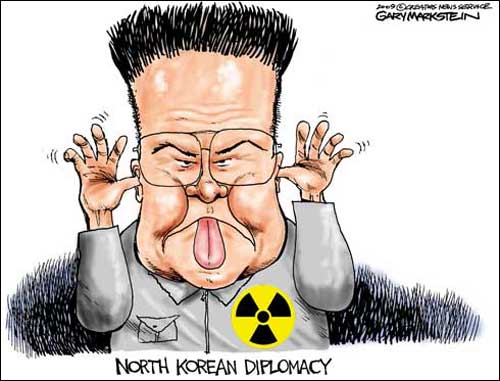
Rather than nuclear weapons, Church argues, North Korea’s greatest strength is the capacity to behave badly: by carefully choosing the right time, it knows its actions will force big powers to pay close attention even though they may grind their teeth. What it fears most is being swept aside in big power politics, so by playing its weak hand cleverly, it seeks dialogue with the United States, a process that was derailed when former president George W. Bush labelled it part of an “axis of evil.”
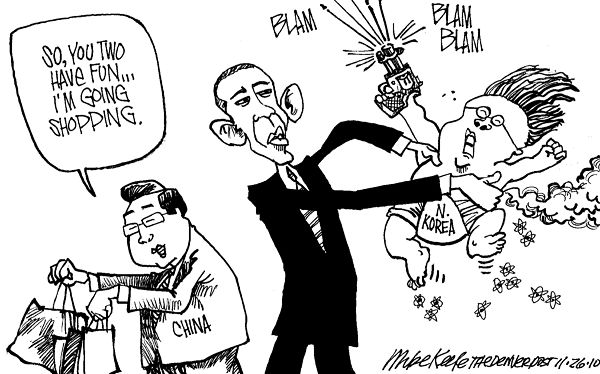
Recent concerns about Pyongyang’s nuclear program stemmed from an underground nuclear test on February 12, 2013—its third in seven years. In response, the United States and its allies pressed the UN Security Council to add new sanctions on the country: enhanced scrutiny over shipments and air cargo, a ban on the sale of luxury goods, expanded restrictions on a range of institutions and senior officials. China, notably, signed on to these sanctions and did not veto them.
If China is dragging its feet on the issue of North Korea, it is also because Beijing has a stake in the survival of the Kim Jong-eun regime. The collapse of North Korea could bring a stream of refugees to China which already has 2 million ethnic Koreans and threaten the stability of the border region. Moreover, since a unified Korea is likely to be led by Seoul, it raises the possibility of US forces on China’s border with Korea. A unified Korea with some 70 million people would also become a formidable economic competitor and transform the dynamics of the regional economy as Timothy Beardson writes in the Financial Times.

When President Barack Obama acknowledges that North Korea does not have a single deployable nuclear warhead, and according to SIPRI, the five permanent members of the Security Council—all declared nuclear powers—had approximately 19,265 as of January 1, 2012, this response to Pyongyang’s third nuclear test seems disproportionate. This is all the more so since North Korea has withdrawn from the nuclear Non-Proliferation Treaty and the other states outside the NPT—India, Israel, and Pakistan—are not treated in the same way as Pyongyang. As Jonathan Steele writes in the Guardian, “If it is offensive for North Korea to talk of launching a nuclear strike against the United States (a threat that is empty because the country has no system to deliver the few nuclear weapons it has), how is it less offensive for the US to warn Iran that it will be bombed if it fails to stop its nuclear research?”
In response, statements in the official newspaper of the ruling Workers’ Party of Korea (WPK), Rodong Simun, on March 6, 2013 declared that if the US continues to threaten it with nuclear weapons, Pyongyang now had the ability to turn Seoul and Washington into “a sea of fire.” North Korea also repudiated the 1953 Korean War ceasefire and cut the Red Cross hotline though lines between military and aviation authorities across the 38th parallel remain open.
Notably, till the middle of March, its foreign office maintained that it will abandon its nuclear weapons program if the United States removes its nuclear threats and abandons its hostile posture.
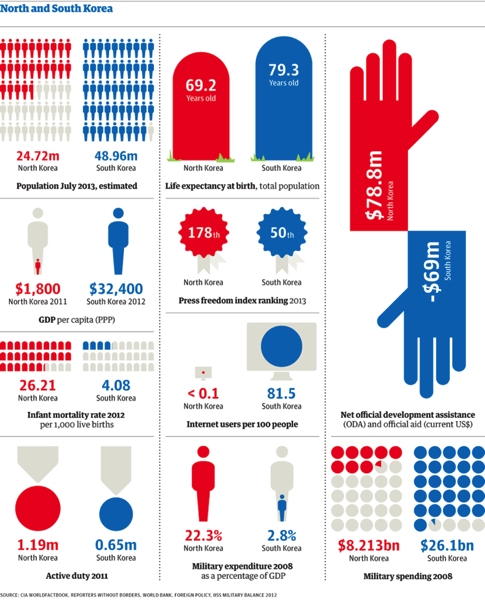
In reply, as Peter Hayes and Roger Cavazos of San Francisco’s Nautilus Institute note, on March 25 the United States flew B-52 Stratofortress stealth bombers over South Korea in military exercises that stimulated a nuclear attack on North Korea. Not only did these military exercises stir deep memories in North Korea where air raids killed an estimated 20 per cent of the population during the Korean War but the B-52 flights at the same time demonstrated China’s inability to affect US mobilization. The United States also bolstered its anti-missile batteries in Alaska and the West Coast.
Should it then surprise us that the North Korean ruling party’s Central Committee Plenum meeting set a ‘new strategic line’ of simultaneously pursuing the path of economic construction and “building nuclear armed forces”? It also announced that it would resume uranium enrichment at the Yongbyon reactor plant that had been moth-balled in October 2007 as a part of the denuclearization process.
Nevertheless, the WPK’s Central Committee Plenum ended by also declaring that “As a responsible nuclear weapons state, the DPRK [Democratic People’s Republic of Korea] will make positive efforts to prevent the nuclear proliferation, ensure peace and security in Asia and the rest of the world and realize the denuclearization of the world.”
In a state born of guerrilla struggle, leadership requires as Hayes and Cavazos suggest, endless battles and if Kim’s leadership itself is not under threat, he needs to embellish his own credentials. Hence, his belligerence is intended as a professor of Sociology at Seoul National University also suggests, as a manoeuvre to outflank the military while preparing the ground to initiate a more pragmatic economic policy. Thus amid the rattling of nuclear sabres, Kim has appointed as his premier, Pak Pong-ju a pragmatic economist who had been forced out of office in 2007 by the military, reportedly because he followed Chinese suggestions on economic reforms too closely.
North Korea does not have enough resources to build its economy and to maintain the world’s third largest conventional armed force. Unlike China when it started its reform process in the late 1970s, Pyongyang does not have a huge reserve labor force in agriculture. Its economy is sustained only by extensive food and oil imports from China. To successfully pursue economic growth, a nuclear deterrent will enable Kim to divert labor from his conventional military and hence the ‘new strategic line’ announced by the WPK’s Central Committee Plenum—to simultaneously work at both economic construction and ‘building nuclear armed forces.’
However, by promising not to export nuclear weapons or material, Kim signals that he has no intention of crossing red lines. Indeed, during the recent visit to North Korea by US basketball star Denis Rodman, Kim asked him to tell President Obama to phone him. The American president pointedly refused to accept this invitation in an interview with George Stephanopoulos.

Again, in an unusual move, North Korea’s ambassador to the United Kingdom, Hyon Hak-bong addressed the Communist Party of Great Britain (Marxist-Leninist) and asserted that North Korea’s only interest was its legitimate self-defence. While North Korean ambassadors have attended meetings of fraternal associations in the past, it has usually been to accept messages of appreciation or praise—not usually to make statements. What better way to signal Pyongyang’s intentions to negotiate than for its ambassador to make a statement in a European capital?
All US Secretary of State, John Kerry, would offer in return was an offer to talk if North Korea offered unspecified concessions to show its good faith. Faced with US and South Korean intransigence, North Korea effectively closed the Kaesŏng Indusrial Park—a special industrial region—where 123 South Korean companies had been employing 53,000 North Korean workers and directly paying Pyongyang $90 million in wages every year. Significantly, while this is a serious loss to the Kim regime, it is also a non-military response to what the regime sees as persistent US provocation.
While the military was suspicious of Kaesŏng, viewing it as a Trojan horse, the regime’s decision to close it (perhaps temporarily) may indicate that it is trying to show that it is willing to bear a significant cost to send a message that it is serious in its stance.
This should be seen in the light of the fact that the government has turned a blind eye to the growth of a market activities in the country which, Andrei Lankov, a Russian specialist on Korea estimates provides 75 per cent of the income of the people outside the military and the upper echelons of the party. Frequent travel to China and the availability of DVDs about South Korea have opened their eyes to new possibilities offered by consumerism.
This makes it all the more important for the regime to compel its adversaries to change their policies, to secure a peace agreement, to denuclearize the peninsula, and to get reparations from the Japanese who colonized the country from 1895 to 1945. This has been the aim of the regime for 60 years but has assumed a new urgency. A peace treaty is a sign that Pyongyang needs to show that the United States and its friends that grotesquely masquerade as “the international community” accepts it as a legitimate state.
Poverty of Political Imagination
August 17, 2012 at 11:48 am | Posted in Capitalism, democracy, Free Trade, International Relations, Labor, Political Economy, Production, World Politics | Leave a commentTags: Capitalism, democracy, European Union, financial crisis, Germany, Greece, Political Economy, Spain, United States, world politics
Though it should not have caused any surprise, the news that Eurozone economies had contracted by 0.2 percent in the second quarter of 2012 underscored the deepening economic crisis faced by the 17-state bloc. Though the German economy may have grown by 0.3 percent, France recorded a third straight quarter of no growth, and the Finnish, Italian, Portuguese, and Spanish economies all fell sharply. Greece, of course, suffered the steepest fall: 6.2 percent in the second quarter–and was 18 percent below its GDP level in the April-June quarter of 2008.
There is little doubt that the declines have been aggravated by a failure of political imagination. Confronted by budget deficits brought about by high levels of government borrowing and by the collapses of housing bubbles, the creation of a common currency has meant that indebted Eurozone economies have not been able to resort to a currency devaluation to gain a competitive edge. Consequently, the troika of the European Commission, the European Central Bank, and the International Monetary Fund sought to impose an “internal devaluation” on these economies by forcing budget cuts to lower government deficits and wage cuts.
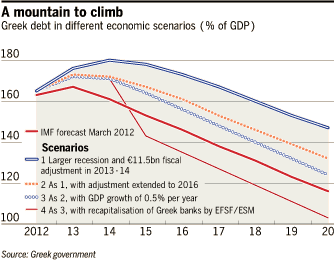
It follows as the night the day that if budgets and wages are cut, the economy will shrink. Lower government spending due to budget cuts means welfare and pension benefits fall, the cost of health care rises, and educational opportunities vaporize. These impact far more adversely on the elderly and the young. With wage cuts, people have less money to spend and this will depress all sectors of the economy–as sales reduce because of lower spending, companies will slash their work forces leading to greater declines in sales and to further cuts in employment. In the most severely affected of the southern European economies, unemployment rates for the youth are already at 50 percent or more. By May 2012, unemployment in the euro zone had already reached 11.1 percent or 17.5 million people and the International Labor Organization (ILO) estimates that it would rise to almost 22 million in the next four years. And if the euro zone were to break up, the ILO estimates unemployment in the 17-state bloc could reach 17 percent.
The adverse conditions created by the stringent cuts mandated by the troika are aggravated by the greater interest rates imposed on the weaker economies by international financial markets–thus for instance, while Austrian banks and other financial institutions can borrow at 2 percent, Italian banks have to pay 6 percent. As these higher interest costs are passed on by the banks to their borrowers, the cost of doing business in Italy, Spain, Portugal, or Greece increases correspondingly and could even negate the wage cuts imposed by the troika!

The effects of economic contraction will spread to the better performing economies. After all, Germany has been able to have a strong industrial sector because cheaper credit to other eurozone members had allowed them to buy German products while the German small-scale sector–which employs 60 percent of the country’s labor force–did not have to worry about currency movements in other European countries or fear that a strong German mark will price them out of the market in other countries.
As Susan Watkins has written, German lessons on debt repayment are especially galling to the Greeks.
Under the Nazi occupation, a hefty monthly payment was extracted from the Greek central bank to cover the Wehrmacht’s expenses; in March 1942 an additional forced loan of 476 million Reichsmarks was levied by the Axis powers. Greek partisans put up some of the toughest military resistance to the Nazis in Europe; the damage wreaked by the occupiers’ revenge was commensurate. Reprisals were exacted on the civilian population at a rate of fifty Greeks for every German killed. Much of the country’s infrastructure was destroyed; forced exports and economic collapse helped bring about one of the worst famines in modern European history.
German occupation (strictly a tripartite occupation since the Italians and the Bulgarians also participated) of Greece also led to hyperinflation–Richard Clogg says it was
five thousand times more severe than the Weimar inflation of the early 1920s. Price levels in January 1946 were more than five trillion times those of May 1941. The exchange rate for the gold sovereign in the autumn of 1944, shortly after the liberation, stood at 170 trillion drachmas.
After the war, the question of German reparations were deferred till German reunification and in the so-called 2+4 (Bonn and Berlin with the US, the USSR, the UK and France) agreement of 1990, Greek claims were excluded. Though several Greek politicians including the current prime minister, Antonis Samaras when he was the foreign affairs minister in 1991, had raised the issue of 476 million marks with the Germans, their demands were summarily dismissed. If this money had, in fact, been paid as the Germans are legally obliged to do, with interest for more than half a century, Greece would no longer be a problem economy.

It is galling too because while ancient historical myths as Greece being the ‘birthplace of democracy’ are routinely trotted out in discussions of the contemporary situation, recent history that people over 70 remember are carefully hidden from view! Be that as it may.
What is crucial is that the crisis demonstrates that capital and finance markets need to be regulated more stringently. It was irresponsible lending that led to high government deficits in Greece and to the housing bubbles in Spain and Ireland, to the subprime crisis in the US, and to the meltdown of the Icelandic economy to mention just the most obvious cases. Financial markets are continuing to demand punitive rates of interest from the weaker economies. The unchecked power of finance must be corralled–or we will enter another great depression just as the obsession with the gold standard led to the depression as Karl Polanyi showed in his Great Transformation.
What is required is a new political imagination not the shrill advocacy of measures that have already aggravated the situation!
The Greek Challenge: Austerity or NATO
May 9, 2012 at 4:16 pm | Posted in Arms Control, Capitalism, democracy, International Relations, Political Economy, World Politics | 1 CommentTags: European Union, Eurozone, France, Greece, Internnational Monetary Fund, NATO
In the Greek elections on Sunday May 6, 2012, the two main parties that had governed the country since the end of the dictatorship–New Democracy and Pasok–and both of which has subscribed to the stringent austerity measures imposed on Athens for a bailout suffered a stunning set-back. Used to dominating the polls, together they received just one-third of the votes. Two-thirds of the Greek electorate voted for parties–including a neo-Nazi party, Golden Dawn–that rejected the austerity measures, though most Greeks still want to remain within the Eurozone. Alexis Tsipras, the leader of the Syriza coalition of green and left parties that placed second in the elections, and was the big winner declared the austerity plan dead. That is certainly what the Greek voters indicated though the German Chancellor, Angela Merkel and the European Commission President, José Manuel Durão Barroso claimed that agreements are binding and cannot be negotiated after every election. By what perverted logic does this hold: last year, when the stringent bailout conditions were imposed on Greece by the ‘troika’–the European Union, the European Central Bank, and the International Monetary Fund–the then Greek Prime Minister Giorgios Papandreou wanted to hold a referendum. Merkel and French President Nicolas Sarkozy, forced him to rescind the referendum. The bailout agreement, then, was foisted on the Greek people not only without their consent, but on the explicit condition that their consent not be solicited. No such international agreement can have a shred of legitimacy and the Greeks voted, in their millions, to reject it!
 It was, Albert Einstein I think who said that the clearest sign of insanity is to persist in doing something that has failed repeatedly. Clearly, austerity programs have not worked. In Greece, unemployment stands at 21 per cent and the OECD estimates that real wages have fallen by 25 per cent in the last two years.According to the IMF, this will be the fifth straight year of recession for Greece to be followed by a year of stagnation. Even if the Greek government were to implement the austerity measures, the IMF estimates that in 2017, the public debt to GDP ratio would be 137 per cent, higher than at the onset of the current crisis. And thus far, IMF projections have been overly optimistic!
It was, Albert Einstein I think who said that the clearest sign of insanity is to persist in doing something that has failed repeatedly. Clearly, austerity programs have not worked. In Greece, unemployment stands at 21 per cent and the OECD estimates that real wages have fallen by 25 per cent in the last two years.According to the IMF, this will be the fifth straight year of recession for Greece to be followed by a year of stagnation. Even if the Greek government were to implement the austerity measures, the IMF estimates that in 2017, the public debt to GDP ratio would be 137 per cent, higher than at the onset of the current crisis. And thus far, IMF projections have been overly optimistic!
None of this should be surprising! After all if incomes are slashed and taxes raised, people are not going to have the resources to buy as many goods and services as they did earlier. This will lead to a contraction of the market and greater unemployment–which in turn will lead to further contractions in demand and the economy will go into a tailspin. Even Antonis Samaras, leader of the conservative New Democracy party and one who adheres to the austerity pact acknowledges that fully a fourth of all Greek companies have closed their doors since 2009 and a further third of the companies do not pay their workers on time!

What is surprising is that by insisting that Greece implement further austerity measures–and even suspend the rights of collective bargaining–the ‘troika’ has excluded Greece’s military expenditures from the scalpel. As Paul Haydon reported in the Guardian:
In 2006, as the financial crisis was looming, Greece was the third biggest arms importer after China and India. And over the past 10 years its military budget has stood at an average of 4% of GDP, more than £900 per person. If Greece is in need of structural reform, then its oversized military would seem the most logical place to start. In fact, if it had only spent the EU average of 1.7% over the last 20 years, it would have saved a total of 52% of its GDP – meaning instead of being completely bankrupt it would be among the more typical countries struggling with the recession.
In the five years to 2010, Greece was the largest customer for Germany’s arms industry. And in 2010, when the first bailout was being negotiated for Greece, Athens spent 7.1 billion euros on arms even as it slashed 1.8 billion in social spending. Daniel Cohn-Bendit, the European member of parliament, even claimed that Papanreou had told him that German and French support for the bailout was specifically linked to continued military spending. In 2010, at 3 percent of its budget on military spending, Athens allocated a higher percentage of its spending to defense than any NATO state other than the United States.

While it is obvious why Germany and France don’t want Greece to cut its defense spending, why are Greek politicians not raising this as an issue?
What Difference Will Hollande’s Victory in France Make for Europe, for the World?
May 6, 2012 at 4:25 pm | Posted in Capitalism, democracy, International Relations, Labor, Political Economy, World Politics | 6 CommentsTags: European Union, Eurozone, France, Germany, Greece, Ireland, Italy, Spain, World-economy
Francois Hollande has defeated Nicolas Sarkozy to become the first Socialist president of France in 17 years. He campaigned on a platform to renegotiate the austerity package that the German Chancellor Angela Merkel and Sarkozy had championed, with the support of the British Prime Minister David Cameron and other ‘center-right’ politicians in Europe. The victorious Hollande argued that the way out of the fiscal crisis enveloping the Eurozone is to focus on growth rather than to reduce deficits. The austerity packages, by sharply curbing government expenditures not only leads to unemployment but also reduced payments to the elderly, the young, and the unemployed. They can therefore no longer consume at their previous levels leading to further unemployment as businesses curtail production and the economy continues its tailspin–as has already happened in Greece, Portugal, Italy, Spain, and Ireland.

But will Hollande be successful in reviving the Eurozone economies? Will this ‘marshmallow’ man (so-called because he hates fights) be strong enough to stand up to Merkel? His potential choice as prime minister, Jean-Marc Ayrault. has suggested that rather than reopening the draft fiscal treaty driven by Sarkozy and Merkel., Hollande will seek to incorporate a minor amendment on growth. This would not be surprising as Hollande’s previous experience in government was as an aide to the last Socialist president of France, Francous Mitterand, who in his second term initiated a wave of neo-liberal reforms that de-regulated much of the French economy.
Socialist and Labor parties in Europe, as political expressions of trade unions since the late nineteenth-century, have floundered as manufacturing has shifted to lower-waged countries and trade unions have suffered a tremendous erosion of memberships. After Margareth Thatcher defeated the miners strike in 1984, European unions have steadily declined in political and social significance.

What, too, is a ‘growth’ strategy has never been addressed except to say that it should not be based on austerity measures. As manufacturing is becoming increasingly automated–labor costs amounted to only $7.10 of a total production cost of $178.40 for Apple’s iPhone 4–high-paying jobs in industry are simply disappearing. In large, vertically-integrated industrial operations, workers going on strike in a singe shop can disrupt the entire assembly line and hence undermine corporate profits. If workers in a gear-box plant down their tools, the entire auto assembly line will soon grind to a halt. Workers in the service sector–in the fast food industry or tellers in banks–simply do not have this structural power and hence their ability to bargain for better wages are far more limited. And as industrial production relocates overseas, more and more workers enter the service industries.
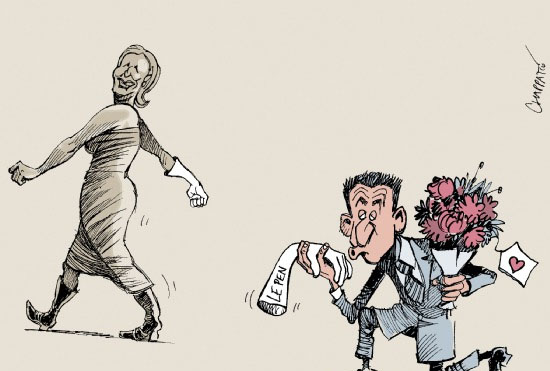
With lower incomes, their ability to consume is more limited. And this makes it less profitable to produce more goods and so industrial production continues to plummet as capital is increasingly allocated to financial speculation. This has the strange effect that whenever an election is held, the first question asked by the talking heads on TV is what would be the reaction of the markets to the results–because after the de-regulation of capital controls, the flows of capital into and out of a country are crucial to its economy and there is not government mechanism to regulate these flows.

In these conditions, governments are compelled to maintain market-friendly conditions and this is not something Hollande is likely to change. So what does growth-oriented policies mean? This needs to be spelt out beyond saying that it is the opposite of austerity programs, How is the economy going to add well-paying jobs in a situation when manufacturing is being steadily downgraded in the hierarchy of economic activities?
Europe: The Democratic Deficit
April 12, 2012 at 10:45 am | Posted in Capitalism, democracy, Free Trade, Human Rights, International Relations, Political Economy, World Politics | Leave a commentTags: 21st Century Capitalism, democracy, Euro, European Union, Eurozone, France, Germany, Greece, Libya, Spain, Syria, United Kingdom, World-economy
“A typical sight during the pre-election protests,” in Spain last year Katherine Ainger wrote in the Guardian, “was a respectable middle-aged man with a cigarette in one hand and a marker pen in the other going from municipal bin to municipal bin writing ‘Vote here’ on the lids.” A few months later, at the other end of the Eurozone, in return for loans from the European Union, leaders of all three major political parties in Greece were required to sign pledges not to rescind a savage austerity program cutting more than 3.3 billion euros from the budget, rendering these pledges concrete and irreversible regardless of the outcome of the general election in April 2012. If the ‘typical sight’ during last year’s Spanish elections suggested that all political parties are the same, the demand that the EU wrested from the Greek politicians proved that their general election, announced for May 6, was rendered meaningless as the victors could not implement a new program. Elections become meaningless.
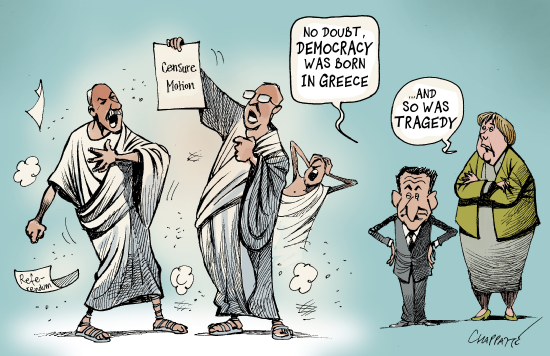
Paradoxically, just as French President Nicholas Sarkozy and British Prime Minister David Cameron after a brief hesitation, abandoned their client dictators in North Africa–even violently overthrowing the Gaddafi regime in Libya and chafing at the bit to do the same to the Bashar al-Assad regime in Syria–Sarkozy and German Chancellor Angela Merkel abandoned all pretense of supporting democracy when they forced then Greek Prime Minister Giorgios Papandreou to cancel a referendum he had proposed on the harsh terms imposed by the European Union for a bailout to Athens in November 2011. Threatening to expel Greece from the Eurozone, they effectively forced Papandreou to resign two days later and for him to be replaced by a national unity government headed by a former Vice President of the European Central Bank, Lucas Papademos.
Reporting in the Guardian, Helena Smith wrote:
For a country not only burdened by debt but closer to default than ever before, his appointment at the helm of a transitional government in Athens would be widely welcomed. An avuncular figure, Papademos is well respected in the European Union. In the corridors of power in Paris and Berlin, the capitals that count in deciding Greece’s fate, he is seen as a safe pair of hands, more capable than most at navigating the crisis-hit nation away from the shores of economic Armageddon.
Yet, this ‘safe pair of hands’ was the very one who, as president of the Greek Central Bank cooked the books so that Greece could enter the monetary union–and he was helped in this creative accounting by the European division of the Goldman Sachs—which is to be headed soon by the current president of the European Central Bank, Mario Draghi—for a fee of $300 million. Northern European governments only feign ignorance of their Mediterranean neighbors’ debts and subsidies, as Wolfgang Streeck notes, because their surveillance agencies could not “have failed to notice how countries like Greece saturated themselves with cheap credit after their accession to the Eurozone.” In fact, as government subsidies slowed down in conditions of budget consolidation, it was private flows that made up the difference–and it profited the export industries of the north because of the improved purchasing power among the Mediterranean countries—the prosperity of the north was predicated on the indebtedness of the south! Despite the fact that Eurostat had disclosed in 2004 that billions of euros had been shifted off public records in Greece, Athens continued to enjoy triple-A ratings.

Even the money being borrowed by Greece may have been the money of wealthy Greeks sent abroad as the Greek upper classes were practically tax-exempt as Stathis Kouvelakis has pointed out. When PASOK took office in 1981, it began to institute a social welfare system but did not seek to enlarge the tax base and even the middle class and the moderately wealthy remained exempt. In a sense then it is the untaxed money of richer Greeks, recycled through European banks, that is the source of the Greek debt! Yet, precisely because these funds were recycled through European banks, a Greek default would undermine the whole European financial system.
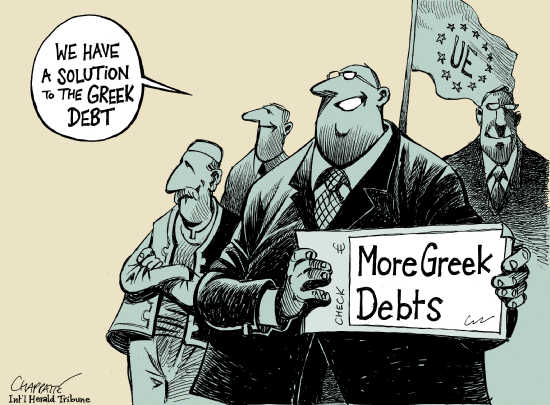
It is no wonder then that Sarkozy and Merkel refused to countenance a referendum in Greece and not only installed their own man at the helm of the government in Athens but placed officials from the ‘troika’–the European Union, the European Central Bank, and the International Monetary Fund–to oversee the operations of the government. Unless the Greek government complied with the stringent terms of the agreement imposed on it, funds in the escrow account will be withheld from Athens: a 32 percent cut in the minimum wage for those under 25, a 22 percent cut for those above 25, a cut in pensions by 25 percent on top of the laying off of some 200,000 workers over the past 12 months.

Given that politicians are hand-in-glove with the banks–from Goldman Sachs helping the Papademos shift billions of euros off the books to the Greek police beat up its Greek citizens to impose order for banks and hedge funds–it is no wonder that citizens are turning their backs on the politicians!
Notes on the Spanish General Strike
March 31, 2012 at 2:19 pm | Posted in Capitalism, democracy, Human Rights, International Relations, Labor, Political Economy, Production, World Politics | Leave a commentTags: 21st Century Capitalism, anti-systemic movements, European Union, Germany, indignados, new forms of protest, Spain, United Kingdom
To be in Barcelona on Thursday March 29, 2012 was to be a witness to a massive tidal wave of humanity on the streets, stretching beyond the horizon in every direction from Placa Catalunya, the city’s symbolic center. This was a response to the general strike called by Spain’s two largest trade unions–Union General de Trabajadores (UGT) affiliated to the Socialist Party, and the Comisiones Obreras (CCOO)–in response to the conservative Partido Popular (PP) government’s decision to announce the most austere budget since the transition to democracy 37 years ago. As evident on the streets of Barcelona, it was much more than a workers’ protest: though some 30 percent of employed workers had said that they would participate in polls before the strike, Spain has a high rate of unemployment–23 percent or double the European rate and almost half the people under 30 are out of work.

The unemployed are the backbone of the indignados (“the outraged”) movement that in May last year that with their tents in city centers and their emphasis on transparency, diversity, egalitarianism, and direct democracy, inspired the Occupy movements across the world. The employment situation is only likely to worsen as Mariano Rajoy, the new PP prime minister who took office in December last year, enacted an Emergency decree two months ago that sharply curbed labor rights. Permanent workers in Spain were eligible for 45 days’ pay for each year of employment if they were fired; this was substantially reduced to a maximum of 33 days and in Andalucia alone eight times as many workers were let go in the two months after the decree was promulgated than in the corresponding period last year. Companies were also permitted to reduce working hours.

The greater flexibility to hire and fire workers provided by the new labor laws may provide greater incomes in the short run to employers but will further depress prospects of economic growth in Spain. Spanish wages are already the lowest among the EU 15 (members of the European Union on 1 May 2004 before the inclusion of states from the former Eastern Europe) and the new law would further depress wages in the context of the high rates of unemployment and provide for more short-term employment–which will lead to a reduction in effective demand.

Moreover, Spain’s economic problems do not stem from high government deficits but from the burst of a property bubble and absurd laws governing liability of borrowers. The Spanish government had run a balanced budget from the time it joined the Euro in 1999 to 2007–that is to say it did not borrow at all during this period unlike many other economies, including Germany, even though interest rates on Eurozone countries fell sharply. However, though Madrid resisted borrowing at lower rates, Spanish citizens could not resist the lure of cheap interest rates and it fueled a housing boom–housing prices rose by 44 percent between 2004 and 2008.
Houses in Spain couldn’t be built fast enough. Great swathes of the coast and the countryside became clustered with urbanisations, instant housing estates thrown up to cater to what seemed to be an endless stream of Britons, Germans, and other norther Europeans now able to live the kind of life abroad of which their parents could only have dreamed.
Once the bubble burst with the financial crisis, however, the economy unraveled rapidly–the number of empty and unsold properties in the country is estimated to be between 700,000 and 1,500,000–and some 40 evictions are taking place across the country per day. Employment in construction collapsed and laid-off construction workers account for fully a third of the unemployed. What is more, Spanish law does not allow homeowners to simply hand over the keys and walk away from a property if they can no longer pay the mortgage. They remain liable for the remainder of the mortgage if the sale of the property does not cover the full extent of the mortgage–and they seldom do in a period when property prices have fallen by more than 19 percent. Hence, unlike most other countries, the unemployed in Spain not only lose their houses but remain responsible for part of their mortgages. This has meant that young people who had moved out of their parental home have often had to move back–and even that grandparents have had to use their pensions to help support their children and grandchildren. In turn, the iaiaflautas or retirees and grandparents have mobilized themselves to occupy buses to protest against price hikes, bank lobbies to oppose bailouts, and health departments to turn back cutbacks.

Hence, even if reports say that the general strike led to a fall in electricity consumption by 16.3 percent compared to a fall of 16.9 percent in the general strike of September 2010, it doesn’t account for the vast mobilization of the indignados, the unemployed, the students, and the iaiaflautas. What it underlines is that a new politics is emerging, a politics that as Ferran Pedret has put it “is characterized by the absence of leaders, by assemblies as a form of organization, and a diversity and transversality.”
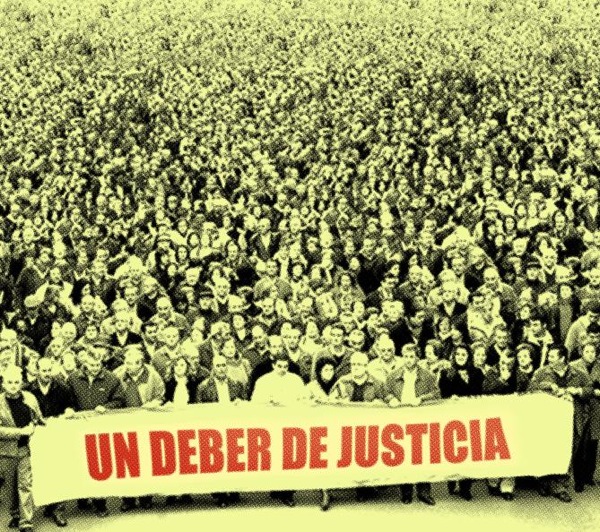
it was this that was responsible for the massive turnout–what the strike symbolizes is a new politics, a politics beyond those of political parties because the parties are fully integrated into the system itself that must be changed. So no mere percentages of electricity consumption, businesses that stayed open, or workers participating in the strike can adequately assess its impact.
End of the Gaddafi Regime and the New Quagmire in Libya
August 23, 2011 at 9:46 pm | Posted in Capitalism, democracy, Human Rights, International Relations, Political Economy, Uncategorized, World Politics | Leave a commentTags: Brazil, Capitalism, China, democracy, France, Human Rights, India, international relations, interstate system, Libya, Middle East, military, NATO, Political Economy, Russia, United Kingdom, United States, world politics
If the fall of Muammar Gaddafi’s 42-year regime is to be celebrated as much as the way in which it was brought about must be condemned. A bunch of regime turncoats, Western agents like the rebels’ “field commander” Khalifa Hifter, and assorted others organized protests against the regime in Benghazi some six months ago in the wake of the fall of autocrats in neighboring Tunisia and Egypt. When Gaddafi counter-attacked, under prodding from France’s Nicholas Sarkozy and Britain’s David Cameron, the United Nations sanctioned NATO to use its air power to “protect civilians” and imposed an arms embargo on Libya. As Simon Jenkins writes in the Guardian, from then mission creep set in–from establishing a ‘no-fly zone’ over Benghazi, the NATO mission turned into a bombing campaign against Tripoli. NATO leaders quickly claimed that Gaddafi had to go–from protecting civilians, regime change became the new goal and even the assassination of Colonel Gaddafi was contemplated.

Shamefully this came about because five members of the UN Security Council–Russia, China, Germany, Brazil, and India–abstained from the resolution 1973 sanctioning intervention, there was no sustained protests across the world against the massive aerial bombardment of Libya for five months by NATO forces. Emboldened by this global quiescence, the fall of the Gaddafi regime was accomplished by NATO’s Operation Siren at the break of the Ramadhan fast last Saturday. As Pepe Escobar writes:
With “Siren”, NATO came out all guns (literally) blazing; Apache gunships firing nonstop and jets bombing everything in sight. NATO supervised the landing of hundreds of troops from Misrata on the coast east of Tripoli while a NATO warship distributed heavy weapons.
On Sunday alone there may have been 1,300 civilian deaths in Tripoli, and at least 5,000 wounded. The Ministry of Health announced that hospitals were overflowing. Anyone who by that time believed relentless NATO bombing had anything to do with R2P and United Nations Resolution 1973 was living in an intensive care unit.
NATO preceded “Siren” with massive bombing of Zawiya – the key oil-refining city 50 kilometers west of Tripoli. That cut off Tripoli’s fuel supply lines. According to NATO itself, at least half of Libya’s armed forces were “degraded” – Pentagon/NATO speak for killed or seriously wounded. That means tens of thousands of dead people. That also explains the mysterious disappearance of the 65,000 soldiers in charge of defending Tripoli. And it largely explains why the Gaddafi regime, in power for 42 years, then crumbled in roughly 24 hours.
NATO’s Siren call – after 20,000 sorties, and more than 7,500 strikes against ground targets – was only made possible by a crucial decision by the Barack Obama administration in early July, enabling, as reported by The Washington Post, “the sharing of more sensitive materials with NATO, including imagery and signals intercepts that could be provided to British and French special operations troops on the ground in addition to pilots in the air”.
Only this massive NATO assault can explain the dramatic fall of Tripoli. But the fall of the Gaddafi regime poses several problems.

First, unlike in Tunisia and Egypt, the fall of the autocrat has also destroyed the institutional props of the regime. Unlike in Egypt, there is no army to step into the breach. While this could mean better prospects for the establishment of a genuine democracy, it is more than counterbalanced by the widespread dispersal of arms among a divided people. Gaddafi had nurtured tribal rivalries as a means to ensure his own survival and these rivalries had already erupted among the rebels when its top military commander General Abdul Fattah Younes was killed by his own troops on July 28. Fierce armed rivalry between tribes and other groups may ensue prompting further international intervention.
Second, five months of unchecked bombing has destroyed much of the country’s infrastructure and especially its oil industry. Before the civil war, Libya produced about 1.6 million barrels of oil a day but this has now dropped to about 50,000 barrels a day. Javier Blas reports in the Financial Times that under the most benign scenario, it woulds take until 2013 or well beyond for Libya to return to its pre-civil war levels of production.

But any such estimates do not account for the enormity of the destruction visited on Libya by NATO bombings–of the highways, bridges, hospitals, homes, essential services, utilities destroyed. Some of us remember all too well the Neocons saying that Iraq’s oil wealth will pay for the war and reconstruction–and look where that got the Iraqis. No aid to Libya can be expected from a Washington held captive to the ‘small government’ policies of the Tea Party acolytes or from a Eurozone dealing with sovereign debt of its weaker members. Like other states of the global South, Libya will be left in a quagmire as NATO seeks other locations to intervene and destroy with nary a whimper from the ’emerging powers’ of Brazil, India, China, or South Africa!
Create a free website or blog at WordPress.com.
Entries and comments feeds.
